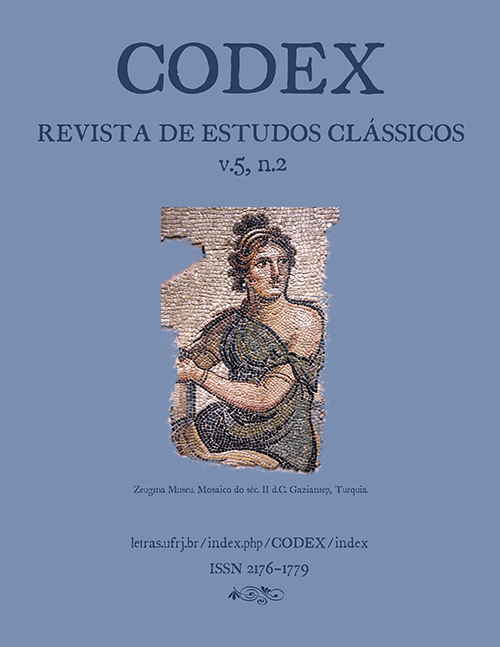Philosophein as ergon: Plato's Socrates in Herodotus' Solon
DOI:
https://doi.org/10.25187/codex.v5i2.14568Keywords:
Plato, Herodotus, sophist, philosophize, poetryAbstract
The purpose of this paper is to show how Plato did not have, at a glance, the poet as his main opponent: as Havelock wishes to prove, Plato's problem is not only a quarrel about orality in poetry against the lettered intellectual. Thus, it is important to notice that in Apology of Socrates, Plato proposes to illustrate the difference between Socrates' philosophein and the activity of the nominated sophistai, as seen that in The Clouds by Aristophanes the Socratic character is presented as a sophistes. However, we cannot forget that in the Fifth Century the words philosopher and sophist had a similar meaning. The aim of this study is, though, to discuss that in Herodotus, when Croesus and Solon meet, it is possible to differentiate the philosophical from certain sophistical activity and Plato probably used this distinction in certain passages in his work to highlight Solon as a singular wise man apart from the others. Hence, there would be a possible diversity of erga in the investigation in order to gain a knowledge. It would be, thus, less of a distinction between the poet of oral culture and the intellectual philosopher what Plato would aim to do immediately, but above all, through the theoretical knowledge, to justify rationally the most beautiful human actions.
References
BARRUECOS, B., ΠΟΛΥΠΕΙΡΟΣ ΣΟΦΙΑ. Heródoto en la História de la filosofia griega. Barcelona: Universitat de Barcelona, 2013.
BRISSON, L.; “Mythes, écriture, philosophie”. In MATTÉI, J. F.; La naissance de la raison en Grèce. Actes du congrès de Nice. Paris: PUF, 1990, p. 50-58.
CHIASSON, C. C.; “The herodotean Solon”. Greek, Roman and Byzantine Studies. Vol. 27, nº3, 1986.
COSTA, I.; “Creso y Solón en el espejo de la Atlántida platónica”, Synthesis (La Plata). Vol. 14, 2007, pp.71-89.
DENNISTON, J. D.; The greek particles. Indianapolis/Cambridge: Hackett Publishing Company, Inc., 1996.
FRIEDMAN, R. D. Home and Displacement in Herodotus' "Histories". Columbia. Tese PhD. 1997.
DYER, L.; Plato's Apology & Crito. London: Ginn & Company, 1908.
HADOT, P.; Qu'est-ce que la Philosophie Antique? Paris: Gallimard, 1995.
HAVELOCK, E. A.; A revolução da escrita na Grécia e suas consequências culturais. Tradução Ordep José Serra. São Paulo: Unesp; Rio de Janeiro: Paz e Terra, 1996.
___________ ; Prefácio a Platão. Tradução Enid Abreu Dobránzsky. Campinas: Papirus Editora, 1997.
HÉRODOTE. Histoires. Texte établi et traduit par Ph. E. Légran. Paris: Les Belles Lettres, 1956.
HERÓDOTO. Histórias livro 1º. Introdução ao livro I, versão do grego e notas de José Ribeiro Ferreira e Maria de Fátima Silva. Lisboa: Edições 70, 1994.
HOW, W. W., WELLS, J,.; A Commentary on Herodotus. Clarendon Press, 1912.
JUFRESA, M.; “Le temps comme sophos”. In LORAUX, N., MIRALLES, C. (org.); Figures de l'intellectuel en Grèce ancienne. Courtry: Éditions Belin, 1998, pp. 191-219.
KATO, S.; “The Apology: the Beginning of Plato's Own Philosophy”, Classical Quaterly, Vol. 41, nº 2, 1991, pp. 356-364.
LEÃO, D. F.; “Sólon e Creso: Fases da evolução de um paradigma”, in Humanitas, Vol. 52, Coimbra: Universidade de Coimbra, 2000, pp. 27-52.
LORAUX, P.; “Le pragmaticien”. In: In LORAUX, N., MIRALLES, C. (org.); Figures de l'intellectuel en Grèce ancienne. Courtry: Éditions Belin, 1998, pp.223-260.
KING, B. L.; Wisdom and Happiness in Herodotus' Histories. Dissertation, Princeton University, 1997.
NAGY, G.; The Ancient Greek Hero in 24 Hours. Cambridge: Harvard University Press, 2013.
NEHAMAS, A. The art of living: socratic reflections from Plato to Foucault. Los Angeles: University of California Press, 1998.
PELLICCIA, H.; “Sappho 16, Gorgias' Helen, and the preface to Herodotus' Histories”. In: DUNN, F. M., COLE, T. (org); Beginnings in classical literature. Yale classical studies. Cambridge: Cambridge University Press, 1992, p. 63-84.
PELLING, C.; “Educating Croesus: Talking and Learning in Herodotus' Lydian Logos”. Classical Antiquity. Vol. 25, 2006, pp. 141--177
RIBEIRO, A. M.; O reverso da Filosofia: o caso Górgias. Tese de Doutorado, Universidade de São Paulo, 2002.
SAGE, P. W.; Solon, Croesus, and the Theme of the Ideal Life. Baltimore: Johns Hopkins University, 1985.
VLASTOS, G.; “Socrates ‘contra' Socrates in Plato”. In ______; Socrates: ironist and moral philosopher. Cambridge: Cambridge University Press, 1991, pp. 45-80.
Downloads
Published
How to Cite
Issue
Section
License
This work is licensed under a Creative Commons Attribution-NonCommercial 4.0 International License.










